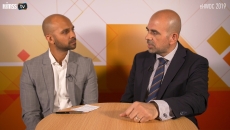Patient Engagement
The government in Pakistan is beginning to understand that technology must be patient-centric, which has been a big challenge to digital health progress in the region, says Dr. Zakiuddin Ahmed, CEO of Digital Care.
The number of consumers selecting such plans represent an increase from the 76% who did so last year.
Improvements in vision from innovative treatments generated $5.1 to $8.2 billion in patient benefits.
Patient autonomy is revolutionized by giving them access to their data, says Enlightening Results CEO Grace Cordovano, a board-certified patient advocate.
"What's needed is to start with the patient, and the patient as a consumer, and add in the relevance of issues outside of a medical condition that are affecting a patient's health. Insurers can't do that on their own."
Mary L. Bouxsein, professor of orthopedic surgery at Harvard Medical School, looks at the effects of space flight on the muscular skeletal system and how to minimize bone loss during long-duration flights such as a mission to Mars.
SPONSORED
The push to the payer-provider model, where the private sector occupies a larger role and patients are put at the center, is the focus for Omar Shraim, CIO at SapphireHMS, Kuwait.
Some hospitals are prioritizing sicker patients first, while others are playing it safe, giving organs to less critical patients.
"The way healthcare is set up, there's a built-in power differential between the patient and the doctor," says Dr. Danny Sands, who explains how the Society for Participatory Medicine, which he co-founded, is working to change that.
Chandima Cooray, chief digital officer of Hemas Holdings, discusses why the conglomerate's healthcare vertical is eyeing improved patient experience, consumer digital health and an IT overhaul for its businesses.






